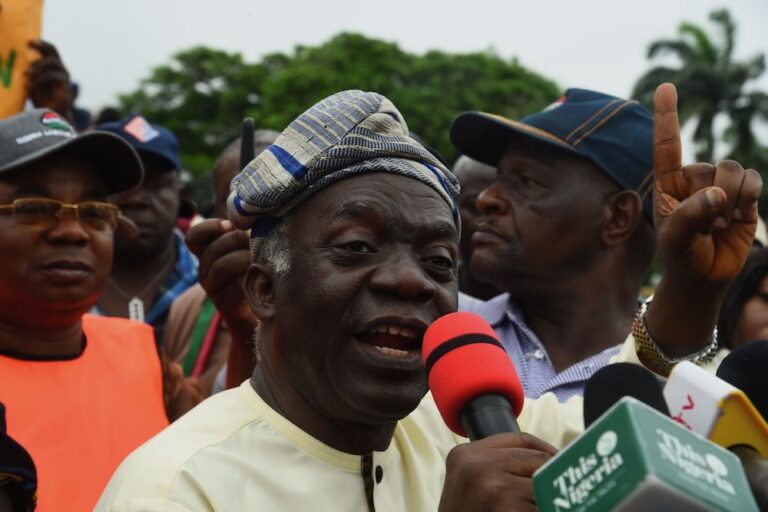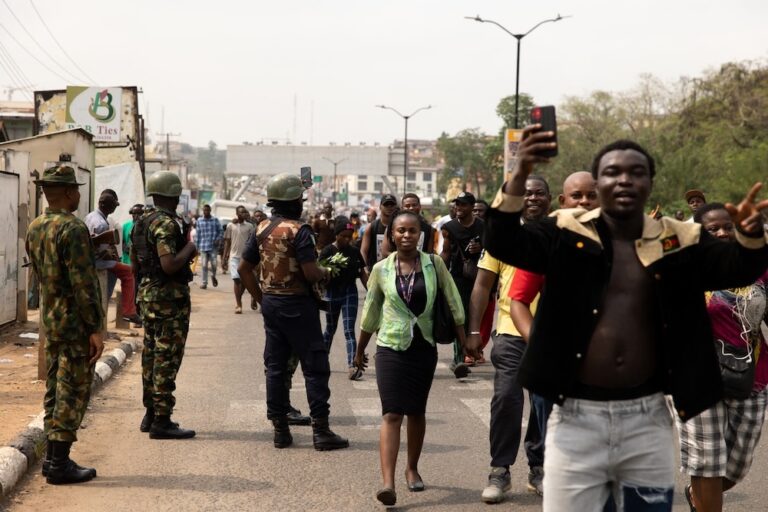(CPJ/IFEX) – The following is a 24 February 1999 CPJ press release: **Updates IFEX alerts of 19 February and 10 February 1999, 14 October, 11 August, 7 August, 10 July, 2 July, 11 June, 10 June, 14 May, 30 April, 29 April, 13 March, 3 March, 26 February, 20 February 1998 and 30 December 1997** […]
(CPJ/IFEX) – The following is a 24 February 1999 CPJ press release:
**Updates IFEX alerts of 19 February and 10 February 1999, 14 October,
11 August, 7 August, 10 July, 2 July, 11 June, 10 June, 14 May, 30
April, 29 April, 13 March, 3 March, 26 February, 20 February 1998 and 30
December 1997**
FOR IMMEDIATE RELEASE
Nigerian Journalists Recount Prison Ordeals in CPJ Report
New York, N.Y., Feb. 24, 1999-With Nigeria on the threshold of a
national presidential election and a possible return to democratic rule,
the Committee to Protect Journalists (CPJ) released a special report
today depicting the horrors Nigerian journalists have endured under
oppressive military rule.
Despite his promises of a democratic election and a transition to
democracy, Gen. Abdulsalami Abubakar has failed to take steps to ensure
that the repressive laws used to criminalize independent media are
repealed.
“Outliving Abacha: Six Journalists’ Prison Stories,” CPJ’s special
report on Nigeria, comprises vivid narratives by prominent independent
journalists who were imprisoned because of their journalistic work:
Kunle Ajibade, Chris Anyanwu, Ben Charles-Obi, George M’bah, Onome
Osifo-Whiskey, and Babafemi Ojudu. The report stresses that despite the
release of 16 journalists who were imprisoned under Abacha, one
newspaper editor has not been freed: Niran Malaolu, the editor of The
Diet, has been in prison for more than a year. He was arrested on Dec.
27, 1997, and tried and convicted by a special military tribunal in
April 1998 for alleged involvement in a coup plot. In July, his life
sentence was reduced to 15 years. He is reportedly critically ill and
denied medical treatment.
“The continued imprisonment of Niran Malaolu serves as a warning to
journalists that while Abacha, the tyrant who put them behind bars, is
gone, his successor could take away their freedom on a whim,” wrote
Kakuna Kerina, CPJ’s Africa program coordinator, in an introduction to
the report.
During the run-up to the Feb. 27 elections, journalists have once again
become targets of the government, said Kerina. Earlier this month,
police raided the printing plant that produces The News, seizing 80,000
copies of the magazine and arresting three people. The confiscated
edition carried an article titled “Abacha’s Co-Looters, Aluko Reveals
All.”
“While Abubakar has made some improvements in the climate for
journalists, we are deeply concerned that violations of press freedom
continue during this sensitive period of transition to representative
democracy in Nigeria,” said Kerina. “We have not seen the new regime act
to remove the legal weapons that still intimidate Nigerian journalists
in their daily work.”
Kerina called upon Abubakar to repeal “all decrees and laws that have
been used to punish scores of journalists,” including the State Security
(Detention of Persons) Decree No. 2 of 1984, which authorizes
indefinite, incommunicado detention of any citizen; the Offensive
Publications (Proscription) Decree No. 35 of 1993, which allows the
state to seize any publication that offends the government; and the
Treason and Treasonable Offenses Decree No. 29 of 1993, which granted a
special military court authority to impose life sentences on journalists
accused of reporting an alleged plot against the Abacha regime.
The report is available on CPJ’s website at .


